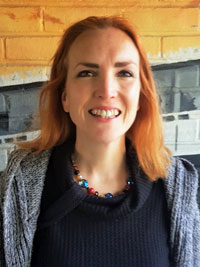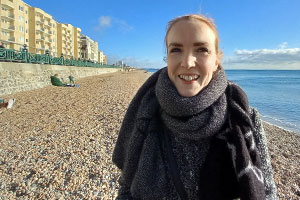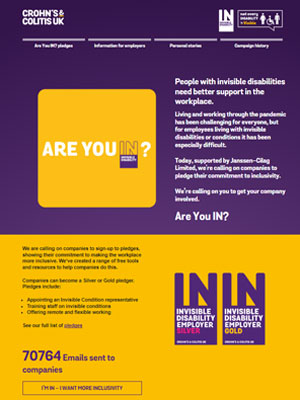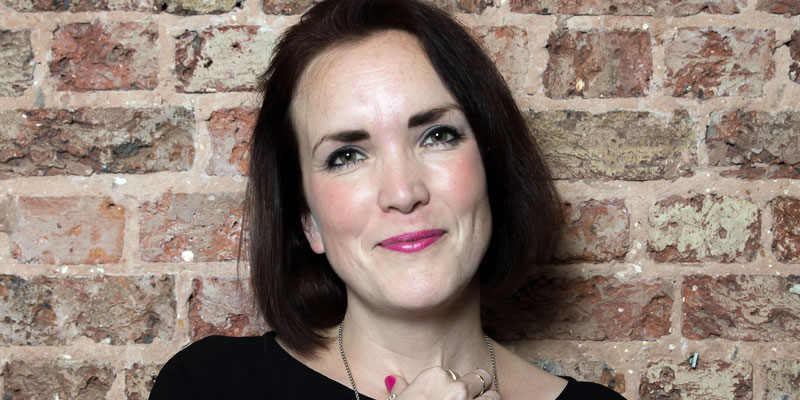Stephanie Hague-Evans is people director at Fizzbox, a Brighton-based company that connects customers with a wide range of activities and experiences. She has recently achieved her Chartered Member status of the CIPD (the Chartered Institute of Personnel and Development) and is a volunteer trainer for Crohn’s & Colitis UK, supporting their inflammatory bowel disease nurses training programme, having been diagnosed with Crohn’s disease aged 17. (Crohn’s is a lifelong disease of the gut, which means that the immune system doesn’t work properly, and there is no known cure.)

“Crohn’s and Colitis are debilitating conditions, that can be utterly consuming but difficult to explain. People often think it’s ‘just’ a bad stomach, or some sickness – it’s hard to convey the extent of the impact that it can have on your life.”
I am NOT defined by my condition
I went to school and sixth form in Windsor, where I grew up – it’s a beautiful place to experience childhood. When I was 18, I went to the University of Sussex to study French and German, but after two years, I was sadly too poorly to continue and after a lengthy spell in hospital, decided to drop out of the course.
I was diagnosed with Crohn’s Disease at the age of 17 after being sick for some time. I was emergency hospitalised and spent that whole summer in a very precarious situation. (Crohn’s is a lifelong disease of the gut and means that your immune system doesn’t work properly. Your body starts attacking itself, causing ulcers and inflammation in the gut, leading to pain, sickness and urgent diarrhoea. There is no known cure.)
When I was finally diagnosed, there was some relief to have an explanation for how ill I was, but it also felt overwhelming to think that there was no cure, and I would have to cope with the condition for the rest of my life.
It took me some years to accept my diagnosis as being something permanent. I powered on through life, despite the endless pain, symptoms, complex surgeries, and long hospital stays, and did my best not to let the Crohn’s hold me back – sometimes to my detriment.
Every Crohn’s and Colitis journey is unique
We know that everyone’s journey with Crohn’s and Colitis is unique. For me, from the time I first got sick at the age of 15, I never entered remission – things just got worse, until I had an emergency total colectomy (removal of my entire colon) at the age of 20.
After two years of struggling to adapt to life with a stoma, I had reversal surgery, to create an internal ‘J pouch’ using the remaining parts of my small intestine. After 8 years of ill-health relating to the J pouch, I finally settled on a permanent stoma at the age of 30 and had further surgery, including a proctocolectomy (the removal of a few other choice bits and bobs!).
This condition is all-consuming. For me, it meant many long spells in hospital, long periods of time on steroids and other strong drug treatments, high levels of pain, sickness, diarrhoea, debilitating fatigue, horrible side effects, countless major surgeries, and multiple scars – both physical and emotional. It took me a decade to accept my stoma fully, but ever since I made that final decision, I’ve felt liberated and have never regretted it, even for a moment.
Since my stoma was made permanent, I have less pain and sickness, and much more freedom. This isn’t a sob story! I live a very happy, fulfilled life. These days, it’s mostly scar tissue pain, as well as inflamed joints and muscular issues, problems with my circulation, anaemia, dehydration, stoma blockages, periods of intense fatigue, and a tendency for my immune system to be weak. Alongside this, I carry some heavy emotional trauma and have, at times, suffered from high levels of anxiety.
In terms of career, I worked for about ten years in the hospitality industry, running pubs and waiting tables. This took its toll on my health, but at the time, it was the only thing that provided me with the flexibility that I needed to manage my condition. I then moved into customer service and operations roles, eventually finding my home within the world of HR.
I embarked on my Experience Assessment via the CIPD in 2020 (during the winter lockdown!) and achieved Chartered Member status. I’m very proud of this accreditation, because I had a mental block on formal learning for some years, following my experience at university. It felt like a seal of approval on the work I had carried out throughout my career, especially since joining Fizzbox, where I have helped to build the brand and culture from day one.
Maintaining a creative, collaborative workplace
I’m responsible for all things ‘people’ related. So, recruitment, onboarding, retention, talent, engagement, employee welfare, health and safety, learning and development. I drive our People Strategy forward, to ensure that we are maintaining a nurturing, creative, collaborative workplace, with a people-drive-profit culture.
I also support with mapping out the strategic direction for the business and work closely with the other two directors to generate growth.
Managing my condition alongside my work
My job is pretty intense, extremely busy, and often stressful. However, I have learnt to tune into my boundaries and limits over the years, so I know when to slow down and when to admit that I’m drowning. This certainly didn’t come easy to me and on many occasions when I was younger, I pushed too hard and nearly reached breaking point.

The understanding of my fellow directors is invaluable. In previous jobs, I often felt like I was pretending to be ok and plastering a smile on my face. Now, I feel more comfortable to let the mask slip and admit that sometimes, my condition has got on top of me, and my fatigue or pain levels need some attention.
Coping during the pandemic
Crohn’s often comes with a certain level of anxiety, and this is something that has been heightened for me at times, since the pandemic gathered pace. Because there are autoimmune aspects to the condition, I have worried that I would be particularly susceptible to COVID, plus I’m asthmatic so was on the ‘high risk’ radar.
In terms of my work set-up, the pandemic has fast-tracked Fizzbox to embrace blended working, and we plan to keep this in place long-term. Our team are trusted to do their work when they want, where they want, as long as the work gets done to a high standard and objectives are met.
We have other team members with invisible conditions, and I know from talking with them, that they have also seen huge benefits to their physical and mental wellbeing from having this flexibility.
We all know that waiting lists within the NHS have been longer than usual, so I’ve had to wait patiently for various check-ups and tests, but I’m very grateful for the fantastic level of care that I receive. The charity, Crohn’s & Colitis UK, has also been absolutely amazing at keeping their network informed and updated throughout the pandemic, with meaningful information from trustworthy sources.
Lastly, the call to action to employers not to revert back to the 9-5 is an important dialogue. So many teams have proven that they can work flexibly, with no impact on business performance – so why roll back the clock? It just doesn’t make sense and it’s short-sighted because people with conditions such as Crohn’s often also have superpowers! For example, I am far more resilient, determined, and empathic than I would have been if I hadn’t had the experience of living with Crohn’s.
Raising awareness of Crohn’s and Colitis amongst employers
Crohn’s and Colitis are debilitating conditions, that can be utterly consuming but difficult to explain. People often think it’s ‘just’ a bad stomach, or some sickness – it’s hard to convey the extent of the impact that it can have on your life. For example, it has always been hard to make people understand that chronic fatigue makes it hard to lift your head up some days, let alone get out of bed and do a full day’s work.

The awareness-raising that the charity has been doing around fatigue is also helpful and important.
Implementing Are You IN? in my own organisation
I feel deeply passionate about the core objectives of the Are You IN? campaign. I also feel privileged that I’m in a position where I’ve been able to help shape our work culture into an inclusive, safe, and supportive one – and where I have opportunities to try to drive change in the wider business landscape.
Since I launched the Are You IN? campaign to the Fizzbox team, multiple employees have already come forward asking how they can get involved, either because they live with an invisible condition themselves, or because they – like me – recognise that this campaign is relevant and timely.
The world of work has shifted, and businesses will simply have to respond in order to attract and retain employees. We know that there are at least one million people struggling with long COVID symptoms in the UK alone. This is an invisible condition that is sadly going to be part of our dialogue for many years to come, and businesses will need to find creative ways to support those who are grappling with these debilitating symptoms.
At Fizzbox, my CEO has been nothing short of amazing, in terms of the support and flexibility he has shown over the years, in relation to my condition. We now want to ensure that this understanding and support is replicated throughout our business culture, for our existing and future employees.
Womanthology readers can find out more about Are you IN at www.noteverydisabilityisvisible.org.uk
Or sign up your own employer to find out more here:
https://r1.dotdigital-pages.com/p/4XJ3-5L2/are-you-in
Coming up next
I am currently doing a one-year coaching and mentoring qualification, which involves virtual classroom days, practice coaching hours and reflective journaling. I am absolutely loving it! I look forward to using this to help the Fizzbox team go from strength to strength and take the business to the next level. But I also hope to use it in my own time, to offer free coaching and mentoring to those who need it and cannot easily access it.
Now that the events and experience sector has opened back up, I am excited to see what 2022 will bring for Fizzbox. And on a personal level, I hope to feel more confident to venture back out into the world and reconnect with the people and places that I’ve been missing.
https://www.linkedin.com/in/stephanie-hague-evans-1a63093a
https://www.instagram.com/fizzboxcom/





